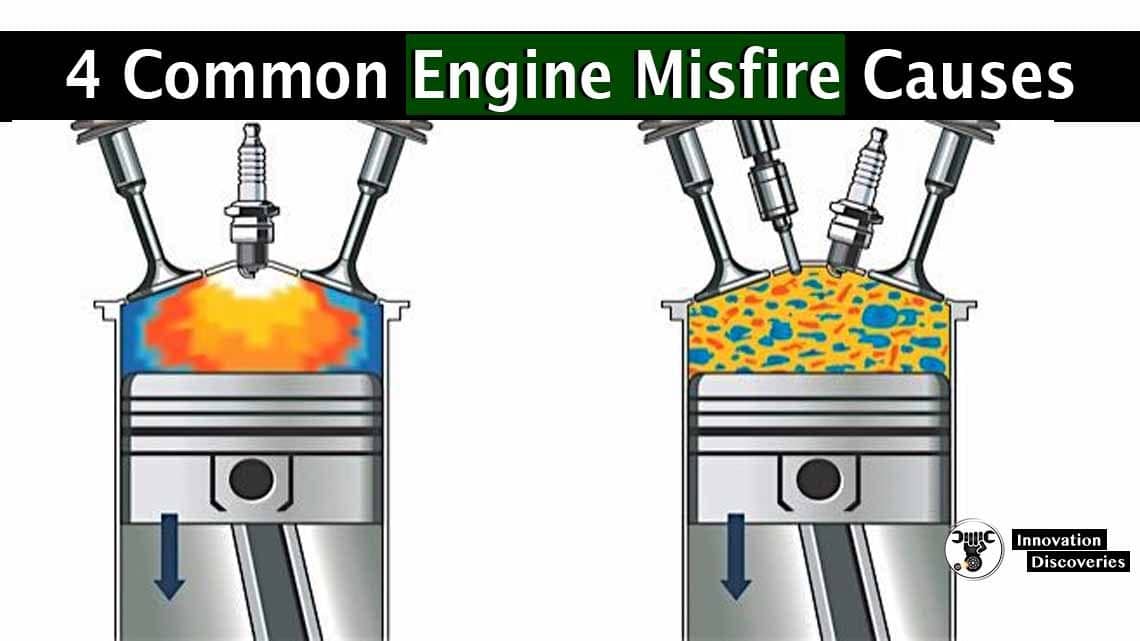
The combustion engine is fairly complex because it has many parts that need to work in the right order and at the right time for everything to work.
Broken, stuck, rusty, or dirty pieces all can cause problems. Some defects may cause a misfire on all the cylinders and some may only cause Malfunctioning.
Causes of an engine misfire can be difficult to find, as so many engine components are involved.
Here are the most common reasons for troubleshooting.
Problems with the Ignition System
Worn spark plugs or spark plugs with the wrong gap are a common issue.
The tip is subtle and has a short life span compared to spark plugs.
If the distance between the spark plug is too wide, Spark cannot always jump between the center and the side electrodes
No spark means no power on that stroke.
Ignition coils (and distributors) convert the relatively low battery voltage into the high voltage the spark plugs allow.
These components may eventually wear out because of the heat generated each time they fire.
If the insulation on the ignition coil is worn, That electricity can go the other way instead of going into spark plugs or wires.
Distributors are spinning mechanical parts found on older cars and are subject to wear as such.
Sometimes carbon, debris, Or water finds its way under the distributor cap, hindering the distributor from transferring the spark to the plug wires.
Water in the distributor cap may make it difficult or even impossible to start the vehicle.
If the ignition is overly advanced or retarded, the spark will fire at the incorrect time and will cause incomplete combustion and a rough running engine.
Check if your distributor is adjusted properly using a timing light.
Some older electronically fuel injected (EFI) engines even have a sensor that will be adjusted during this way (such as the cam angle sensor on older Mazda MX-5 Miatas). ask a repair manual for vehicle-specific instructions.
Spark plug wires are a standard failure mode, as they wear out even faster than ignition coils.
A worn sparking plug wire may fire intermittently, weakly, or not at all.
These are often tested employing a timing light or a multimeter with an inductive pickup.
The pickup is placed around the sparking plug wire and therefore the device gives a reading whenever the wire fires.
If the timing light never illuminates or the multimeter shows low or no voltage, you recognize you’ve got a problem.
Don’t discount the apparent, though. confirm the sparking plug wires are firmly attached to the ignition coils and therefore the spark plugs.
You’ll want to get rid of and inspect each wire to seem for corrosion.
Corrosion can leave a gap between the coils, wires and spark plugs,
This causes the engine to miss that stroke
1) Ignition System Issues
There could be a problem coming from any one of the components in the ignition system.
Perhaps the spark plugs aren’t creating an adequate spark for the internal combustion chamber.
You could also have a worn-out ignition coil, ignition cables, rotor, or distributor cap.
If any of these problems exist, the internal combustion chamber’s air and fuel mixture won’t be able to ignite properly.
The weak spark will cause an engine misfire, but you might not notice right away. But as you operate the vehicle, you’ll feel its jerkiness very well.
2) Air to Fuel Ratio Imbalance
One of the main reasons for an engine misfire can be attributed to an imbalance in the air to fuel ratio within the internal combustion chamber.
This usually means there is not enough fuel and too much air being mixed.
For combustion to be successful, the mixture needs more fuel than air.
Otherwise, you will notice the cylinder misfire while your engine is idling.
But when you’re driving at faster speeds, the symptoms of the misfire will go away.
The reason there may be an imbalance could be due to a bad fuel pump, clogged fuel filter, or a bad air flow sensor.
3) Transmission Issues
There are times when the misfire might not even come from your engine. It could come from the transmission instead.
If your car starts to jerk around as an engine misfire had occurred, your transmission may not be able to adequately shift up or down.
You will notice this more when you’re driving at faster speeds.
This is a bad situation like any other misfire and you need to have it repaired right away.
4) Mechanical Problems
Your vehicle is made up of many mechanical parts which contribute to the functionality of the engine.
There are piston rings, camshaft lobes, valves, and cylinder walls.
If any of these parts were to get worn out, it could cause an engine misfire. The same goes for when there’s an intake manifold gasket leak or a head gasket leak.
Other possible mechanical issues may include a bad fuel injector or damaged rocker arms.
Check the timing belt to see if that’s installed correctly too because it may have slipped.
You will know when there’s a misfire caused by mechanical issues because there will be a thumping feeling from the vehicle that will never go away, regardless of your speed.
5) ECM Problems
Sometimes there may be a glitch in the engine control module or the central computer of the vehicle which manages the engine.
Any minor glitch there could throw off the combustion process and cause a misfire.
Fortunately, there is an easy remedy for this type of problem that works most of the time.
If you simply disconnect your battery for a few minutes and then reconnect it.
It’s similar to rebooting a computer at home and this should solve any minor glitch or bug in the computer system.
If the bug still exists after that, then you need to have the central computer examined at the dealership where you got the car.
Read More:

